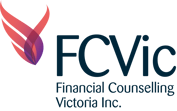Financial counsellors are here to help
A financial counsellor can help you to understand...
Bills and loans
Debts
Housing payments
Fines
Utilities
Scams
Government assistance
Consumer and financial rights
Financial counselling is a free, confidential and judgement-free service for people experiencing or at risk of financial hardship.
Financial counsellors provide information, advice and advocacy to empower people to make informed choices. They will work with someone to determine all of their options in relation to their financial position.
A financial counsellor can:
- determine whether someone has been sold products or signed up for loans that are unsuitable
- help someone understand what entitlements or grants they are eligible for
- advise and assist with debt problems, or disputes with banks, utility providers, telecommunications
- advocate on someone’s behalf with banks or other creditors, when the person is unable to advocate for themselves
- make referrals to other professionals where appropriate for the person’s situation, such as to community legal services, therapeutic counselling, or family violence services
- provide information about consumer rights
A financial counsellor does not:
- lend money
- provide material aid
- recommend any kinds of loan products
- do tax returns
- provide debt consolidation services
- provide financial product advice, or
- deal with investments

Frequently asked questions about financial counselling
Financial counselling is a free, confidential and judgement-free service
for people experiencing or at risk of financial hardship.
Financial counsellors provide information, advice and advocacy to empower people to make informed choices. They will work with someone to determine all of their options in relation to their financial position.
Financial counselling is available to anyone who is experiencing, or at risk of, financial difficulty. If you or someone you know has a debt or bill that they are worried about, they could benefit from a confidential appointment with a financial counsellor.
There are no access restrictions based on income source, visa-status or residency-status.
Financial counsellors receive specialised training to deal with a range of issues, including matters relating to:
- credit law and consumer rights
- debt and debt enforcement
- family violence and economic abuse, including elder abuse
- gambling related harm, both for the gambler and family members
- bankruptcy
- fines and infringements
- external dispute resolution schemes
- disasters
- small business issues
Financial counselling is always 100% free.
Financial counsellors work under credit licence and financial services licence exemptions which, along with professional body standards, requires financial counselling services to be free of charge, without remuneration, independent (free from conflicts), non-judgemental, and confidential.
Financial counsellors are employed by agencies – typically not-for-profit community organisations – that operate under specific sub-regulations of the Corporations Regulations 2001 and the National Consumer Credit Protection Regulations 2010.
The conditions of the exemption require the financial counselling service to be free, independent and without conflict. The requirement for no conflict means industry cannot directly fund financial counselling positions, which are primarily funded by state or federal governments, or through philanthropic sources.
Financial counsellors are not financial planners or advisors, accountants or lawyers.
Financial counsellors provide free information, advice and advocacy to empower people to make informed choices.
Financial planners and advisors provide fee-for-service advice to help people plan for the future, using wealth creation and wealth management strategies. Financial planners and advisors must hold an Australian Financial Services Licence.
To practice as a financial counsellor in Australia, you must
- hold the Diploma of Financial Counselling,
- be eligible for membership of your state financial counselling association by satisfying the annual requirements for continuous professional development and professional supervision, and
- be employed by a financial counselling agency.
